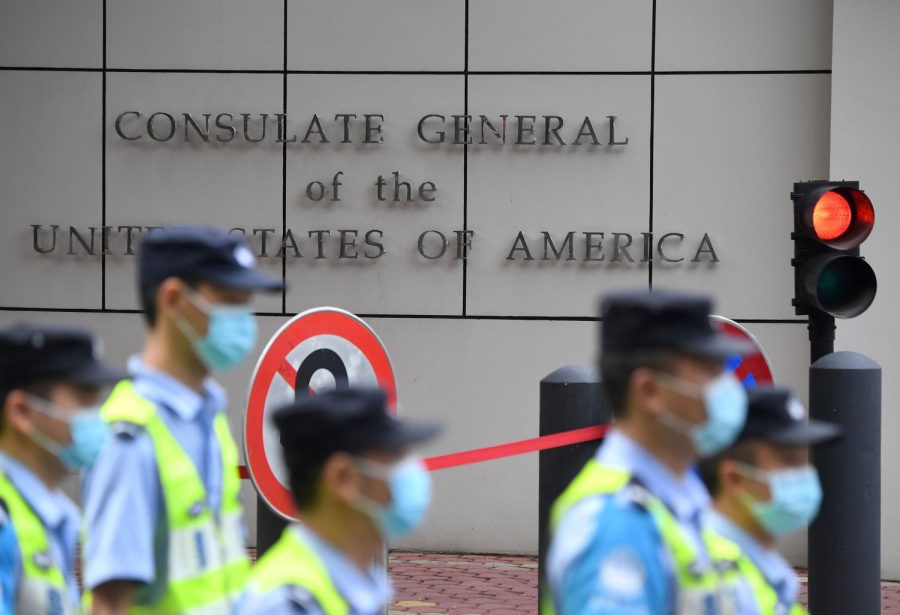US consulate in Chengdu officially shuts in retaliation for Houston closure
Policemen walk past the US consulate in Chengdu, southwestern China’s Sichuan province, on July 26, 2020.
David Culver and Ben Westcott, CNN
July 27, 2020
The American flag over the building was lowered at dawn, according to Chinese state-run broadcaster CCTV, and onlookers were moved back by police surrounding the consulate as it prepared to shut.
Beijing ordered the US embassy to close on Friday in a tit-for-tat move, after Washington instructed China’s consulate in Houston, Texas, to cease operations, claiming it had been involved in a US-wide Chinese espionage effort.
The Chinese government gave the Americans the same 72-hour time frame to close their Chengdu mission as Beijing had been given in Houston last week.
As that deadline expired, the Chinese Ministry of Foreign Affairs said in a statement Monday that the Chengdu consulate closed at 10 a.m. “Relevant Chinese authorities then entered from the main entrance and took over,” the ministry said in a statement posted on Chinese social media platform Weibo.
A State Department spokesperson confirmed to CNN that the consulate closed at 10 a.m. local time due to the Chinese government’s “withdrawal of consent for operation.” The spokesperson said diplomats and their family who were posted at the consulate will depart China by August 27.
“The consulate has stood at the center of our relations with the people in Western China, including Tibet, for 35 years,” the spokesperson said. “We are disappointed by the Chinese Communist Party’s decision and will strive to continue our outreach to the people in this important region through our other posts in China.”
Over the weekend, hundreds of people had gathered outside the US consulate in the city of 16.5 million people, taking selfies and waving Chinese flags.
On Saturday, the US insignia was taken down, while on Sunday removal work began on a plaque outside the embassy and shipping containers were loaded onto trucks, as staff prepared for the consulate to be closed.
Chengdu, the capital of China’s southwest Sichuan province, was an important diplomatic outpost for the US, covering a large swath of the country, including the controversial Tibetan Autonomous region.
A video posted to Twitter by the US Mission in China on Monday morning featured images of the Chengdu consulate being opened by then-Vice President George Bush in 1985, before listing the areas covered by the diplomatic mission, such as Tibet.
“Today, we bid farewell to the US Consulate General in Chengdu. We will miss you forever,” the mission’s official post said.
Espionage allegations
Last Tuesday, Washington told China to “cease all operations and events” at its Houston consulate, claiming that the mission had been coordinating espionage at a Texas research institution.
US officials told reporters Friday that staff at the Chinese consulate “were directly involved in communications with researchers and guided them on what information to collect.”
According to a senior State Department official, the idea to close the Houston consulate emerged this spring after China interfered when US officials returned to the consulate in Wuhan to retrieve diplomatic materials.
The Chinese Foreign Ministry called the closure of the Houston consulate an “unprecedented escalation” of ongoing tensions between the two countries.
“The current situation between China and the United States is something China does not want to see, and the responsibility rests entirely with the United States,” the Chinese foreign ministry said in the statement.
As the deadline to close the Chinese diplomatic mission expired on Friday, US federal agents entered the compound of the Houston consulate in black SUVs and white vans.
US-China tensions rise
Tensions between the US and China have been strained by the ongoing trade war, allegations over the coronavirus pandemic and US criticism of human rights abuses in both Hong Kong and Xinjiang, which Beijing denies.
But in the past two weeks, relations have deteriorated even further, amid the reciprocal consulate closures and the guilty plea of a Singaporean national who admitted to spying for Beijing in the US.
Experts have warned that the downsizing of diplomatic avenues available for engagement leaves both countries vulnerable to misunderstandings and a further escalation of tensions.
Speaking at the Nixon Library in California on Thursday, US Secretary of State Mike Pompeo blasted what he said were decades of failed policy toward China.
“As President Trump has made very clear, we need a strategy that protects the American economy and indeed our way of life. The free world must triumph over this new tyranny,” Pompeo said.
“The truth is that our policies — and those of other free nations — resurrected China’s failing economy, only to see Beijing bite the international hands that were feeding it. We opened our arms to Chinese citizens, only to see the Chinese Communist Party exploit our free and open society.”
The-CNN-Wire™ & © 2020 Cable News Network, Inc., a WarnerMedia Company. All rights reserved.









